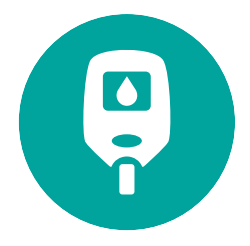Managing Blood Sugar and Chronic Kidney Disease

Relationship Between Diabetes and Kidney Disease
High Blood Sugar and Kidney Disease
High blood sugar, or hyperglycemia, occurs due to a buildup of glucose in your bloodstream, causing your blood sugar levels to spike higher than normal. This is common among people with diabetes since their bodies aren’t able to properly use or regulate glucose. However, frequent or ongoing high blood sugar can cause damage to your nerves, blood vessels—and, yes, your kidneys. To help protect your kidney function, it is important to keep your blood sugar levels balanced. If you are experiencing high blood sugar levels, make sure to talk with your physician about the best options for managing your blood sugar.
What are the causes of high blood sugar?
- Forget to take your insulin or diabetes medicine
- Eat too many calories, especially from sugar
- Have an infection or are ill
- Are under stress
- Become inactive
- Participate in intense activity when blood sugar levels are high and insulin levels are low.
What are the symptoms of high blood sugar?
- Dry mouth
- Blurry vision
- Increased urinary frequency
- Increased thirst
- Headaches
- Stomach pain
- Drowsiness
- Hunger
- Rapid heartbeat
- Nausea and vomiting
Low Blood Sugar and Kidney Disease
Low blood sugar, or hypoglycemia, occurs when your body doesn’t have enough sugar to use as fuel. When your blood sugar levels are low, the American Diabetes Association recommends eating a snack with at least 15 grams of carbohydrates. Since glucose is your body’s main energy source, low blood sugar requires immediate treatment. Familiarize yourself with the causes and symptoms below so you can recognize them and act quickly. If you are experiencing low blood sugar frequently, make sure to talk to your physician about the best options for managing your blood sugar.
What are the causes of low blood sugar?
- Take too much insulin or other diabetes medications
- Eat less than usual
- Exercise more than usual
What are the symptoms of low blood sugar?
- Confusion
- Difficulty waking up
- Difficulty speaking
- Shakiness
- Hot flashes
- Sweating
- Lightheadedness
- Racing pulse
- Hunger
- Pale skin
- Difficulty concentrating
- Poor coordination
- Numbness in mouth and tongue
If you are experiencing more than one of these symptoms, stop and call 911 as you may be at risk for a diabetic coma.
Tips for Maintaining Balanced Blood Sugar Levels
- Test and track your blood sugar levels. Blood sugar testing can provide useful information about what may be causing your blood sugar to be high or low, and help you reach your ideal range. It can also help track your progress. Check with your doctor to determine how often you should test your blood sugar levels.
- Stay active and maintain a healthy weight. Exercising requires your body to use more glucose which can help lower your blood sugar. It also helps you maintain a healthy weight, which is important in managing your blood sugar levels since excess weight can lead to insulin resistance. Overall, staying active and monitoring your weight can help you be your healthiest and feel your best.
- Eat according to your nutrition plan. A dietitian can help you develop a meal plan based on your goals and lifestyle. Similar to exercising, sticking to your meal plan will help you control your glucose consumption and manage your weight. For example, eating foods high in calories and fat can cause your body to create excess glucose. Alternatively, not eating enough food can cause your blood sugar to drop. Therefore, following a well-balanced meal plan and eating at set mealtimes can help you control your blood sugar levels.
- Monitor your intake of carbohydrates. Carbohydrates are broken down into glucose to provide energy into your body, however, too many or too few carbs can impact your blood sugar levels. Therefore, it is important to monitor your intake of carbs so you can balance your sugar levels and avoid other complications. Carbs are found in several foods including breads, grains, fruit, dairy products, sugary foods and drinks, and even some vegetables such as potatoes, corn, beans, and peas.
- Take your medications as prescribed. Sometimes diet and exercise aren’t enough to maintain your target blood sugar level. Your doctor may prescribe medication to help you achieve your targets. It is important to take these medications as prescribed to avoid any spikes or drops in your blood sugar.
High and low blood sugar levels are common among people living with diabetes due to the body’s inability to properly make and regulate insulin. Therefore, when living with diabetes and kidney disease, a key to slowing the progression of chronic kidney disease is maintaining balanced blood sugar levels. Following a healthy, kidney-friendly diet, exercising regularly, and taking your medications, and tracking your blood sugar will help you achieve balanced blood sugar levels and feel your best. Talk to your doctor to determine what is best for you and your unique needs.

